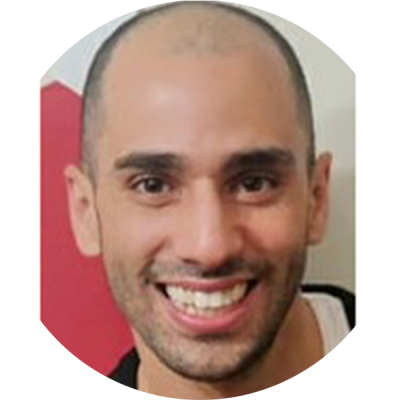
Firas Mawase
Stroke is one of the most common causes of physical disability worldwide, and the majority of people with stroke experience impairment of movement. Lesions to the motor areas in the brain following a stroke cause deficits in generating isolated finger movements, thus limiting basic daily functions. Unfortunately, conventional rehabilitation strategies fail to improve hand dexterity in the chronic stage of the stroke. In our study, we developed a novel motor skill training protocol and showed that individualized and intense motor skill training improves finger dexterity and basic hand functions, and reduces abnormal finger flexion synergy in people with chronic stroke. I am doing my research in the Human Brain Physiology and Stimulation Lab directed by Dr. Pablo Celnik at the Department of Physical Medicine and Rehabilitation.
Questions & Answers
Why did you choose Johns Hopkins for your work?
I was interested in understanding how the brain recovers after injuries as well as in developing better, easier and quicker solutions for the recovery process. I found that Johns Hopkins is unique because it is home to experts in clinical practice and research, and it integrates clinical practice and research, making it an ideal location to tackle challenging clinical problems with cutting-edge approaches.
What does receiving this award mean to you personally and professionally? Do you have any connection with the particular award you received?
I feel extremely honored to have received this significant award. This award has encouraged me to continue to pursue scientifically founded and clinically relevant research projects. I believe in the core values of the Young Investigators’ award because giving it to the fellows has a profound impact on them and also has the potential to impact society through his or her current and future work. I don’t have connection with the award I received.
What contributed to your project’s success (special skills, interests, opportunities, guidance, etc.)?
My persistence, interest in stroke recovery, analytic and clinical skills, and, most importantly, the great opportunity to work with my talented mentor and colleagues all contributed to the success of my research.
What thoughts do you have about Young Investigators’ Day itself, as a celebration of the roles student and fellows play in research at Johns Hopkins?
The Young Investigators’ Day provides a very important stage for supporting personal and professional development. This day harnesses the interpersonal and teamwork research skills, and further ignites an ambition for leadership and scholarship among the recipients.
What has been your best/most memorable experience while at Johns Hopkins?
Working with people with stroke who have different backgrounds, abilities and challenges has been immensely rewarding. Also, collaborating with talented colleagues has been an extremely memorable experience at Johns Hopkins.
What are your plans over the next year or so?
I am expecting to open my own lab as a principal investigator in a department of biomedical engineering in Israel, my home country, starting on fall 2018.
Tell us something interesting about yourself that makes you unique. Do you have any special hobbies, interests or life experiences?
I enjoy the time with my two little kids. Despite their young ages, they have taught me lessons in responsibilities, efficiency and persistence. In my free time, I enjoy playing soccer, running and cooking.